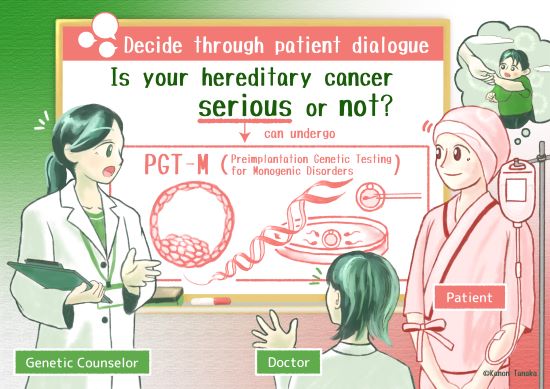A team of three Japanese researchers has conducted a survey of stakeholders to examine how patient voices impact decisions related to genetic testing for hereditary cancers. These stakeholders included patients, healthcare professionals, and ethicists attending a workshop in Hiroshima in early 2025. The correspondence is published in the European Journal of Human Genetics on March 15, 2025.
There are differences of opinion in how to assess “seriousness” in genetic conditions. “In Japan, the seriousness of genetic disorders has traditionally been assessed using narrow medical criteria, limiting access to preimplantation genetic testing for monogenic diseases to only a small number of conditions. However, cases like retinoblastoma—which was only recognized as ‘serious’ after six years of patient advocacy—underscore the urgent need to incorporate stakeholder values and lived experiences into these assessments,” said Shizuko Takahashi, a Research Fellow at National University of Singapore. Drawing on a framework proposed by Kleiderman et al., the team conducted a two-stage survey during a stakeholder dialogue event in Hiroshima in January 2025, exploring how the participants’ understanding of “seriousness” evolved in response to patient testimonies and discussion.
The team used a recent review by Kleiderman et al. as a framework for understanding the multifaceted concept of seriousness in genetic conditions. This framework, published in a recent issue of the European Journal of Human Genetics, emphasizes the core dimensions and procedural elements of seriousness, offering valuable insights into the Japanese context. Many countries have expanded access to preimplantation genetic testing for monogenic disorders. However, Japan continues to be restrictive, having approved only 17 conditions under the strict criteria set by the Japanese Society of Obstetrics and Gynecology.
The team conducted their survey in two phases, assessing the participants’ perceptions before and after patient testimonies. First, a clinical geneticist explained the medical criteria for preimplantation genetic testing for monogenic disorders, treatment options, and available support resources. The geneticist addressed core dimensions such as “medical criteria,” “access/availability of treatment,” and “access/availability of support and resources.” After that first presentation, individuals with hereditary cancer—including patients with retinoblastoma and BRCA2 mutations—shared their lived experiences. This juxtaposition of medical information with personal narratives allowed participants to reflect on how “individual and familial lived experiences,” a crucial core dimension, influence their perceptions of seriousness.
Before hearing patient testimonies, 66% of participants indicated they would consider preimplantation genetic testing for monogenic disorders if faced with hereditary cancer, citing a desire to prevent the inheritance of debilitating conditions. In addition, 89% believed that patients should be informed about preimplantation genetic testing for monogenic disorders at the time of diagnosis, highlighting the importance of access to information.
However, the participants’ perspectives shifted notably after hearing patient stories.
The proportion of participants who viewed preimplantation genetic testing for monogenic disorders primarily as a public health tool aimed at reducing the burden on society significantly decreased (p = 0.005). In addition, there was an increased emphasis on individual reproductive autonomy. The participants’ favorable attitudes toward marriage, pregnancy, and family planning with preimplantation genetic testing for monogenic disorders rose from 54% pre-testimony to 71% post-testimony. These shifts highlight how firsthand accounts can recalibrate people’s ideas about “seriousness.”
“Lived experiences profoundly shape how people understand the ‘seriousness’ of hereditary cancer—and shift perceptions of preimplantation genetic testing for monogenic disorders from a tool of societal burden reduction to one of individual reproductive autonomy,” said Rie Iizuka, an assistant professor (special recognition) at Hiroshima University. This underscores the urgent need to include patient voices in shaping ethical frameworks and policy decisions around genetic testing.
The team notes that while this is the first study to examine stakeholder perspectives on preimplantation genetic testing for monogenic disorders in Japan, it has a couple of limitations. First, the sample size was relatively small, and participants were drawn from a preimplantation genetic testing for monogenic disorders-related event, introducing potential selection bias. Second, the definition of stakeholders in this study was limited to individuals affected by hereditary cancer. This excluded those with other genetic conditions. “Future research will seek to include a broader and more diverse participant pool, both within Japan and internationally. Our aim is to provide empirical support for applying Kleiderman et al.’s argument—that assessments of the seriousness of genetic conditions should meaningfully incorporate stakeholders’ lived experiences—to the criteria guiding the implementation of preimplantation genetic testing for monogenic disorders,” said Tsutomu Sawai, a professor (special recognition) in ethics at Hiroshima University.
The authors of the correspondence article include:
* Shizuko Takahashi from Yong Loo Lin School of Medicine, National University of Singapore; University of Tokyo, Graduate School of Medicine; and the Department of Bioethics and Humanities, University of Washington, Seattle.
* Rie Iizuka from the Headquarters for Co-creative Future Sciences, Hiroshima University, Japan.
* Tsutomu Sawai from the Graduate School of Humanities and Social Sciences, Hiroshima University, Japan; Yong Loo Lin School of Medicine, National University of Singapore; and the Institute for the Advanced Study of Human Biology, Kyoto University, Japan.
The research is funded by the Japan Society for the Promotion of Science KAKENHI, the JST Research Institute of Science and Technology for Society, and the Uehiro Foundation on Ethics and Education.
Journal: European Journal of Human Genetics
Title: Reevaluating ‘seriousness’ in genetic conditions: balancing clinical criteria and lived experiences
Authors: Shizuko Takahashi, Rie Iizuka & Tsutomu Sawai
DOI: 10.1038/s41431-025-01829-6

 Home
Home















